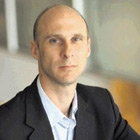sable blog post« Back to Blogs Listings
November 06, 2015

Searching for Einsteins: Africa at Cutting Edge of Scientific, Tech Advancement
Rowan Philp
In this piece written previously by Rowan Philp, Editorial Director for SABLE, for AFKInsider, one of Africa's leading minds - Professor Neil Turok - sets out the campaign to unearth "African Einsteins" to unleash the continent's innovative potential.
Most people’s lists of critical priorities for Africa would feature safe water sources, primary healthcare, basic education and jobs. How about Ivy-league tuition in quantum theory and mathematical physics? Not so much?
In fact, a project is now being rolled out across the continent in the belief that it’s precisely those arcane things that are needed to jump-start Africa’s development. Called the “Next Einstein Initiative” (NEI), handsomely funded centers for post-graduate math and physics training — featuring sometimes Nobel Prize-level lecturers — have been launched in Ghana, South Africa and Senegal. A fourth center is due to open in Cameroon. Ultimately, African Institute for Mathematical Sciences (AIMS) will be established in 15 African countries, the brainchild (or brain explosion) of one of Stephen Hawking’s chief collaborators.
Dr. Neil Turok, a native of South Africa, is literally hunting for African Einsteins, Newtons and Teslas in hopes that such an ambitious search will also throw up job-creating pioneers like Tim Berners-Lee, Mark Zuckerberg and Sergey Brin.
In an interview, Turok said that while global aid and steadily growing economies struggle to push African development from the bottom, cutting edge research will pull from the top. Or – at the very least – with the number of scientific research papers having plummeted in Africa in the past 40 years, it might stop the rot.
Turok further made this prediction: that young African geniuses would “do for global science and technology what Jewish geniuses did” at the turn of the 20th century, when, collectively, they paved the way for modern electronics and the digital age. “In the late 19th century, when Jewish people were finally allowed to study science and technology degrees at European universities, they revolutionized science and (changed) the world,” he said. “Something very special happens in science when different cultures bring fresh perspectives, and I expect these very talented Africans to do the same.
The pilot center – housed in a once-derelict, art deco hotel in Cape Town – has already graduated 442 master’s students since its launch in 2003. Some of them now work on the Large Hadron Collider experiment in Switzerland and others at the National Institutes of Health in the U.S. – but, crucially, over 60 percent continue to research, innovate and teach in Africa. Many are using advanced modelling theory to track epidemics and markets in Africa.
Tens of millions of dollars in funding have come from a combination of local government departments, Google grants and the Canadian government, with celebrity fundraisers like Bono recruited to seek further support.
But can such an investment gamble be justified, given Africa’s life-and-death needs?
In an interview, Barry Green, director of AIMS in Cape Town, argued that the program was a bargain at three times the price. First, he said advanced math tuition provides problem-solving tools and conceptual awareness, which graduates can apply to any field they enter in Africa. Green also makes the winning point that math costs virtually nothing in terms of equipment overheads for research and tuition. He says five students gain world-class post-graduate training there for the cost of one in the west.
Kidist Zeleke, a 2007 AIMS graduate from Ethiopia, is now completing her math Ph.D at the University of Houston. She says, “There is almost nowhere in the world of higher education where you can be in a non-stop learning environment. AIMS was the place where I have drawn courage and hope for the future of Africa; where I was convinced that science and technology is the main way, if not the only, to solve the grand challenges in the continent.”
Meanwhile, Turok concedes that the curriculum was expanded in 2008 to include practical — if less exotic — courses in entrepreneurship, computer science and policy study. Still, the focus remains on the kind of science which even some western universities regard as a luxury.
It’s perhaps telling that Turok’s billionaire “boss” has already made the same gamble.
The co-founder of Blackberry, Mike Lazaridis didn’t donate his disposable cash to charity, political causes or small business start-ups as other billionaire pioneers have done. Instead – with his eyes still set firmly on return on investment – the entrepreneur launched a Canadian institute for research into the most exotic physics out there, from quantum field theory to extra-dimensional cosmology.
He poached Turok to be director of the Perimeter Institute for Theoretical Physics, with a brief to incubate the kind of research which might launch new technologies – notwithstanding Turok’s joke that, for any economy, “a cosmologist is probably the most useless person on the planet.”
So what does Lazaridis know that the rest of us don’t? In a recent interview with local Canadian media, he said information processing was increasing so fast that digital technology would soon be redundant; that a theoretical framework would be needed for quantum and nano machines.
“I started to see that there’s a crisis coming where, based on Moore’s Laws predictions, as transistors and lithography and integrated circuits become smaller and smaller every 18 months or so, we’re going to reach the point where things become the size of atoms. And that’s expected to happen anywhere between 2015 and 2020,” Lazaridis said.
Turok said he immediately recognized an opportunity for Africa. While the west clings to its digital age, Africans could skip that tech generation and zoom right past.

Rowan Philp is a multiple award-winning writer, news editor, journalism coach and foreign correspondent, who has covered conflict, business, public health, science, news events and foreign policy from 27 countries. Previously, he was the Chief Reporter for Africa's leading newspaper - the Sunday Times (South Africa) - for most of the past decade; a period book-ended by fellowship stints at the Washington Post and at Harvard/ MIT.

